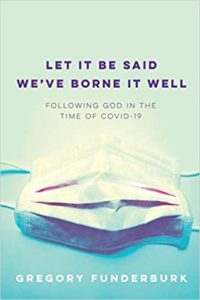Greg Funderburk’s first book followed the survivors of the Great Storm that killed 8,000 people in Galveston, Texas, in 1900. His second book, released this month, is a devotional born from the COVID-19 pandemic that has killed nearly 3 million people worldwide.
Funderburk, minister for pastoral care at South Main Baptist Church in Houston, admits he feels strongly drawn to natural disasters and human suffering — but from a pastoral, rather than a morbid, perspective.
“As a pastoral care minister, I think that’s what my ministry is: helping people face tragedy and very difficult personal situations and finding hope and acting on the possibility of hope.”
 That’s what Funderburk sets out to do in Let It Be Said We’ve Borne It Well: Following God in the Time of COVID-19.
That’s what Funderburk sets out to do in Let It Be Said We’ve Borne It Well: Following God in the Time of COVID-19.
Based on weekly devotionals he has penned for the South Main community during the pandemic and on previous sermons, Funderburk presents 60 three-to-four-page essays designed to move readers from self-awareness of their struggles to self-care and ultimately on to self-giving.
It’s an approach similar to that used by ministers to nurture those enduring loss and all manner of health and other personal struggles, Funderburk said. And it is an evolution of ministry people were in need of during the coronavirus outbreak and beyond.
“The idea is to encourage everyone and give them a little more confidence walking through this together. That is what this is meant to be — another level of pastoral care.”
That also was the idea behind the series of devotional articles Funderburk wrote for the South Main website and its various social media sites beginning in early 2020.
“The idea is to encourage everyone and give them a little more confidence walking through this together.”
“When the pandemic started last March, one of the things we thought the congregation might need is a word of encouragement each week,” he explained. “So, I started writing an essay once a week, choosing a word, phrase or concept that would be uplifting to folks and draw their focus to positive things.”
Topics included gratitude, joy, endurance and finding ways to be OK when everything is not OK.

Greg Funderburk
“I was most concerned about whether we had a pastoral care system that gives everybody a touch so they don’t feel like they are going through this alone, especially at the beginning when we weren’t even meeting,” he said. “I felt some anxiety about people falling through the cracks.”
The essays, now functioning as book chapters, touch on Scripture and seek to appeal to readers with references to popular Hollywood films, pop music, professional sports, history, travel and classic literature in a way “that communicates that God broadcasts to us in all sorts of ways we often might not expect,” Funderburk said.
The text also is structured to offer ideas on how to be of service to others even as challenges continue, he said. “It isn’t meant to be super-introspective. It’s about taking the gift God has given you — your life — and giving it back to people.”
Funderburk said pastoral experience has taught him that helping others can change the perception of a challenge from negative to positive. “Their temperament can be down but sometimes if you give them an opportunity to serve somebody else, their temperament picks up. I think we’re just wired that way.”
That wiring also became evident during the research and writing of The Mourning Wave: A Novel of the Great Storm, Funderburk’s first book, which is a work of historical fiction published late last year.
The novel follows its characters from barely surviving a hurricane to their eventual emotional and spiritual healing. “If you look at the two books, you can see that it’s important in life, especially in dark times, to look up and search for hope and search for a way out and to then find people who can help,” Funderburk said.
While COVID-19 is in the title of the new book, he added that his latest work was written to outlast the pandemic by being framed with references to future challenges: “I really do think it will continue to speak to other trials that may be before all of us or before individuals.”


